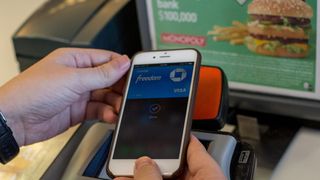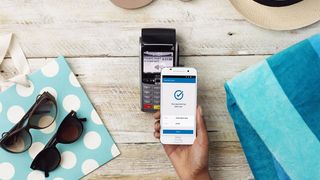Beyond the wallet: how will you be paying for things in 2021?
PayPal's Rob Skinner talks to TechRadar about social payment

PayPal's Rob Skinner is pretty happy with his five-year old prediction that we could all be using a digital wallet instead of a physical one by 2016, but his thoughts have already turned to what the next five years will bring.
It was 2011 when Skinner and PayPal went public with the assertion that we could be using just our phone to pay for things within the next five years, and amid the arrival of payment systems from Apple and Google, you could indeed leave the house in many cities without picking up your faithful leather friend.
Despite the obvious headlines, Skinner was never suggesting the death of the traditional wallet, just that the choice would be there.
"That's the key point," he tells TechRadar in a conversation that coincides with the 10th anniversary of the first PayPal mobile transaction in the UK.
"So much of what we do is about choice - whether that's letting people choose a different way of funding a Paypal payment or recognising that cash is going to be about for a long time to come.
"Many people still choose to carry a physical wallet mobile, but we are getting to the stage where you don't have that anxiety of not finding anywhere to use [a digital wallet] and it will grow significantly in days and months to come."

The obvious question, of course, is to ask what 2021 will bring to the world of consumer payment, and although Skinner is not yet ready to roll out the big proclamation, PayPal is already pursuing many avenues to ensure it remains at the heart of its market.
Get daily insight, inspiration and deals in your inbox
Get the hottest deals available in your inbox plus news, reviews, opinion, analysis and more from the TechRadar team.
"The big trend we are already seeing get started in the US is contextual commerce," he says.
"We're all used to shopping on a website, but this is about taking payments out of the commerce setting and putting it in a social setting."
So an example of that is buyable pins on Pinterest or Facebook and Uber collaborating. If you're meeting friends and arranging that through Facebook actually, you don't have to go to Uber app to order an Uber.
"It's making payments as seamless as possible. You can imagine so many different contexts for it to happen. So it's looking for transformational experiences."
So will embedded tech or simply thumbprints without the phone become more prevalent? Skinner is not ready to commit - but he does say that these are both examples of moving beyond traditional security gateways like passwords, something he's hugely interested in.
"We've seen finger print recognition and one-touch payment and it's looking at how we make that experience even better.

"Security is fundamentally important so you have to strike the right balance between experience and security. We'll never compromise on that because that's what we built our reputation on."
PayPal is a significant global brand, but a lot of its most important work goes on without people being aware that they are using technology owned or powered by PayPal. But does this mean that the brand is fading into the background because of seamless transactions? Will we even recognise the name PayPal in 2021?
"We are happy that PayPal is very well recognised and trusted... but equally the best kept secret is PayPal is behind the scenes powering so many mobile payments," says Skinner. "The purchase of [payment gateway tech company] Braintree a few years ago was so important.
"We're happy to be a partner of choice for businesses, but from a consumer perspective PayPal wallet remains the original and most popular digital wallet in the world."
Patrick Goss is the ex-Editor in Chief of TechRadar. Patrick was a passionate and experienced journalist, and he has been lucky enough to work on some of the finest online properties on the planet, building audiences everywhere and establishing himself at the forefront of digital content. After a long stint as the boss at TechRadar, Patrick has now moved on to a role with Apple, where he is the Managing Editor for the App Store in the UK.
Most Popular



